David Corson - Commercial Construction 2022 Recap - PODCAST TRANSCRIPTION
February 22, 2023 at 9:00 a.m.Editor's note: The following is the transcript of a live interview with David Corson, the publisher/editor of Commercial Construction & Renovation. You can read the interview below or listen to the podcast.
Speaker 1: Welcome to Roofing Road Trips with Heidi. Explore the roofing industry through the eyes of a long-term professional within the trade. Listen for insights, interviews, and exciting news in the roofing industry today.
Heidi Ellsworth: Hello and welcome to another Roofing Road Trips from RoofersCoffeeShop. This is Heidi Ellsworth, and I am here today with David Corson from Commercial Construction & Renovation. And, David, you are a repeat guest. Welcome back. It's the end of the year, and so we need to hear what's going on because, oh, man, the media is just throwing so much out there about construction and what's going to happen and everything. And so I thought, "You know what? We need to get to the people who really are seeing, knowing what's going on." Before we dive into that, can you introduce yourself for everybody so anyone who didn't hear your last podcast, and tell us a little bit about Commercial Construction & Renovation Magazines?
David Corson: Been a publisher for over 25 years, started at Nielsen, went out on my own 2001 right after 9/11. Rolled the dices, nine out of 10 businesses don't make it, and I'm still standing today. Went through the internet bubble burst, then through the 2008 economy falling off the cliff, and now just going through the rollercoaster of 30 months, and I'm still standing.
But now I'm a digital guy. I don't print the magazine. I'm 100% digital. This is what my magazine used to look like. It was beautiful. This is AAA from Southern California, [inaudible 00:01:36] Jason, director of facilities. Oh, such a good looking magazine. I miss it. But you know what? Don't miss the post office, don't miss the printer, don't miss any of that stuff.
Heidi Ellsworth: Digital is where it's at.
David Corson: Hey. I've been around a long time. My sweet spot is retail, restaurant, hospitality, but we've also added some other sectors, cannabis, healthcare, federal, craft brew, commercial interiors. I have a women's section in there as well. I do a big event in January called My Summit. This year it's hybrid, Atlanta locals, the rest will be virtual.
Heidi Ellsworth: Awesome.
David Corson: I do a cocktail party every month. I was doing them before the shutdown every month in a different city, took a hiatus, did some virtual stuff, but now, next year... Actually, I'm going out to Phoenix next week for an in-person event with the Retail Contractors Association and during Centerbuild, which is ICSC, which is International Center for Shopping Centers.
Anyway, we'll do our reception out there. I'll run a coverage in the magazine, but starting in February I'm going to get back on the road as [inaudible 00:02:48] Delta, and get in the exit row and we'll fly around and do... We normally do a little activity, and then we'll end up at a bar for [inaudible 00:02:58] some appetizers and I run it like a people section in the magazine.
Heidi Ellsworth: Yeah, that's awesome. Love it.
David Corson: So that's my gig. It's been fun here. Some of my covers in the back. I've got JLL, Chris at Mammoth Holdings, one of the largest car washes in the country. The chicken guy, I got Tim Holder, UK retailer, you got a healthcare facility coming up out of Texas, a rehabilitation center that's just supposed to be cutting edge and all sorts of stuff.
Heidi Ellsworth: All kinds of cool-
David Corson: You were a contributing editor in my Women in Construction supplement.
Heidi Ellsworth: Yeah. That was really cool. And that's been fun. We've been going back and forth and sharing things, and I think it is important because even though roofing's pretty much a subtrade, so much of our world is affected by what's happening on the commercial side, on new construction, on restoration, and everything that's going out there. That's why I was really excited to say, David, come on back and talk to us a little bit about what you've seen in 2022. What have been the highlights, and what have been the low lights this year on the commercial real estate, commercial side of construction?
David Corson: I'll tell you, if you were deemed an essential business, which a lot of people were, most contractors, pretty much, really depending on what sector you were in, if you were building restaurants, you probably took a hit. But if you were building multi-family or healthcare or any of that kind of stuff, you put your mask on, and you got on the plane and you just went along with your business. I think that was the only difference. And there was a little more protocols on the construction sites. Fast-forward to now, permitting's an issue, products, diesel, got a serious diesel crisis coming up.
Heidi Ellsworth: It seems to be there's just a lot of, we just don't know. And you're right.
David Corson: We don't know all of those.
Heidi Ellsworth: Yeah. There's supply and demand issues. There's the material shortages. There's labor. But now I think we are going to see some of that labor, hopefully, balance out a little bit because as they leave some sectors, there's still going to be work in construction. Well, and I'm not talking just about on the roof. I'm talking about overall in the office, in sales, you name it, we see it every day in our classifieds on RoofersCoffeeShop. And so maybe some of this we'll be able to start getting some people coming into the trades that are still going, are still backlogged. I mean, when I look at all the cranes that are in all these big cities on the commercial side of it, just we and what we're hearing from the roofing contractors out there, maybe a little bit of softening, but overall still backlogs, still working.
David Corson: It's going to get better, but it's going to be worse before it gets better.
Heidi Ellsworth: Yeah. And like you said in your introduction, you went through after 9/11, with the recession in 2008, so have I. I've been through all of these ups and downs, and all you can do... I always tell everybody's like, "All you can do is go to work every day and run a smart business and see how those things come through." But one of the things, David, that I really wanted to get out there, too, is some of the trends that we're seeing, and I'm just going to... Because, obviously, this is Roofing Road Trips, so we got to talk a little bit about roofing.
One of the things we're seeing, we just had a great panel discussion on Coffee Conversations earlier this year on Prologis. So, obviously, I'm sure you've had Prologis in your magazine many times, but Prologis has a net zero by 2040 on carbon. And so they are putting solar arrays. They are doing electrical vehicle stations. They're doing all of this stuff. It was fascinating to see such a big company like Prologis really making that commitment and doing all this and working with the different folks.
What are you seeing rooftop-wise, especially with the infrastructure bill and now the Inflation Reduction Act? We're hearing a lot on solar and on white roofs and on garden roofs. What are you hearing from the building owners?
David Corson: They're all dabbling in it in some way or fashion. Some of the bigger boxes, they've all put in the EV charging stations, they're all putting up panels to gather energy. So when they're not off the grid, they can sell their energy supply. Like myself, I'm building my house, my empty nester house up on the lake. So we just got our plans done. So I'm fighting with the HOA because I want to put solar panels up there. No one else has it. There's 50 lots. I'm one of them, but they don't want to let me do it. And I'm like, "Yeah, well, I'm going to tell you right now I'm putting artificial grass, AstroTurf, in my backyard. You won't let me put it in the front because I don't want to cut grass anymore. I don't want to waste for water. I want to be sustainable and so forth. But okay, I'll put the sod in the front."
But in the back I'm putting that, I'm putting turf. I'm not going to do it. But the same thing. So I'm fighting with them right now because I'd like to put the solar panels on there, but if it's not sunny, you're not going to gather power. It's the same thing with the wind turbines. If the wind's not blowing, you're not gaining energy. So I think some of the states and some of these companies are, they have the right attitude. But I think it's really, it's a balancing act because you just can't turn off one switch and just go completely to the other end, because technologically we aren't there as around the world. We're just not there. It's like combustion engines. They want to get rid of gas cars.
Heidi Ellsworth: It's a long term. You got to start somewhere. So that's what we're doing, right?
David Corson: Yeah. You can gradually start. Like this weekend we went out and looked at some trucks. I looked at... I have an F-150 and so we're four guys, and my kid's got one, my wife. Anyway, we went and looked at this hybrid F-150. It gets about 800 miles to the gallon, and it's got this really cool screen. It shows the engine when it goes off and when it's on, when it's charging. And I think it had 36-gallon tank in there. $80,000-
Heidi Ellsworth: Geez.
David Corson: -for the truck. But I looked at her and said, "You know what, I'm going to let the... It's new. I'm going to let the kinks roll out and down the road, maybe I'd buy it." It's like when a phone comes out, they always have patches, whatever. Let them work the kinks out.
Heidi Ellsworth: Well, and that's been happening with the solar industry for a long time. I mean, this has been going on a long time. And we're really starting now to see that switch that hopefully some of those kinks are getting worn out. In fact, we're even hearing, they're talking about taking the solar arrays and making sure that they're putting the roofs down. This is on flat, obviously, low slope.
David Corson: Flat, low slope.
Heidi Ellsworth: But that are wanting to make sure their arrays and the roofing system are going to last the same amount of time. I mean, they're really thinking through all of this and kind of putting it together. 'Cause no one thought about that before. It's like, okay, now the roof's done and we have all these solar arrays, and we got to reset them [inaudible 00:10:24] to reset.
David Corson: The EV charging stations are probably the biggest thing. Not to get off roofing, but the EV charging stations are probably the biggest thing that people are big gangbusters about in getting them in their parking lots or in their buildings. My son works at Boeing. They've got four of them there. I had never been in a Tesla. He looked at buying a Tesla when the gas prices were really, really high. And what an unbelievable automobile. Just Elon Musk thought about freaking everything. I mean, the guy's unbelievable. The car will literally drive itself to the airport, drop you off, and drive itself back and put itself the [inaudible 00:11:05] Going around the curves when the guy didn't have his hand on the steering wheel. I mean, it was like-
Heidi Ellsworth: Wow.
David Corson: It was mind blowing. But he thought about everything. And so the whole electrical thing, it's trying to figure out the best way to implement it, but not stranglehold themselves so it's too expensive. And the biggest thing is the electrical grid in the country. That's got to get rebuilt if you're going to have all this. I mean that's what it comes down to. If the electrical grid doesn't get fixed, I don't care how many electrical vehicles you have, you're not going to be able to charge them all. I mean, look at all the blackouts now, and we don't even have all these cars and stuff on them.
Heidi Ellsworth: Yeah, definitely. It's one of those things, it's like we can't keep waiting the chicken or egg. It's got... It's happening, but we keep hitting like, oh, well, we're not ready there yet. Oh, we're not ready there yet. But I do want to... One of the things that was really interesting, I was at the National Roofing Contractor Association meeting last week, and sustainability came up as a huge topic. So even beyond solar, obviously, that's a part of it, but the sustainability, and the contractors are saying, "How much do we really need to worry about this?" And the manufacturers are saying, "You need to worry about this because it's being specced, it's being regulated." And so having your environmental product, data sheets, all of that. And I'm also wondering, and I'm thinking just knowing what Prologis did, how much of that is also being driven from the building owners and the facility managements, property managements, all these big groups on having to hit sustainability.
David Corson: I'll tell you, I just had a guy on my podcast that did insulation for buildings, and he's making it out of hemp. And he went through his whole process, and he'll use it for roofing insulation, building insulation, both commercial and residential. And it's a natural substance. It's not fiberglass. You don't have to wear gloves for the install and have to deal with all the regulations.
Heidi Ellsworth: Nice.
David Corson: So he's using natural resource that's safe and that is going to be easy to install, affordability-wise. And there are all these other types of products that are coming out there from a sustainable... You know when the USGBC came out, whatever it was, 10, 15 years ago, I forget. Anyway, everybody was like, oh, be green, be green. See a lot of... But you have to buy the label so you can stick it on the side of your building so people know that.
Now I think everybody understands what sustainability is and being green and conserve and recycle and make sure you have clean water and the air's clean and all that stuff. So everybody's, in the back of their mind when they're building something, they want to be able to promote it that they're green, that they're trying to reuse, recycle. If you ever see a news article, oh, we're going to close 20 stores. But if you read about four or five paragraphs into it says, oh, we're going to build 10 more new ones. So not only will they get rid of the old stores that were old dogs anyway and they needed to be redone, some of them will come in there, and they'll put the new signage in, whatever they're going to do, and the new stores are going to [inaudible 00:14:25].
So it's just like a hurricane. When the hurricane was down in Florida and, God, I feel terrible for the western side of Florida. But from a construction side, like everybody that was a key tree cutter or a roofer or whatever, but that was in Atlanta, they're all down in Florida right now still cleaning up and rebuilding. So from that aspect, even after disasters, they're terrible to talk about, but from a construction point, it's a very positive thing because everything's got to get rebuilt.
Heidi Ellsworth: Right.
David Corson: And-
Heidi Ellsworth: That's what we keep seeing, too. And to your point, all these buildings out there that have to be repurposed that now have remote workers, and we're even seeing some of that, believe it or not, rooftop, I mean, that has to be repurposed. How is it being used? What's the ROI on it? Just like what's the ROI on the building? And there's such a housing shortage, a lot of these buildings are going to be. So that that's all work. That's all work for the construction industry. That's going to continue no matter what because there's still so much demand out there.
David Corson: Oh yeah. I mean, listen, I sold my house last October, and we had to find a house. We bought our land, and we put our house up for sale, and I told my wife, "Look, we got to find a house." We were out there bidding on these little homes to live in while we were going to build. We were going to act as our own contractor. Anyway, we'd go out there, and we'd be going up against 50 people, and you'd go in there, and they give you 15 minutes, and then you'd walk out, and there's three other people waiting in there. And so we paid cash for it. But if you didn't have cash, if you were getting a mortgage, you weren't even going to get in there. And this is before even they raised the rates.
So finally I told my wife... We found this house, and I said, "Do whatever you need to do," and we had to pay way, way over what the thing is worth. But I was like, I don't care. I got five dogs. No one's going to rent something to me, and if we don't find a house, we're going to be living in a tent, or we're going to be living in the middle of Georgia in nowhere.
Heidi Ellsworth: And now it's kind of shifting again, and everything's going. I know. It is crazy. Okay, 2023 and you kind of started talking about it earlier. So we've kind of seen the trends that have happened in 2022 with what's been going on, the repurposing of the buildings, the roofing, the carbon, the sustainability. If you look into your Magic 8 Ball, what are you looking at as some of the things that really roofing, commercial roofing contractors should be aware of of some of the trends that you see coming or some of the things that you see coming in 2023?
David Corson: I think the biggest thing that a roofing contractor and whatever the materials that they're using is, they want to be architectural stimulating. They want to save energy. They want to have instant, easy installation and they want the guarantee. And that's the biggest thing, like a residential roof. It's your last 15 to 20 years. Maybe they need to build a more. So the roof is probably the most important thing on any commercial building because if you don't have the roof and it leaks, it's not a good thing.
Heidi Ellsworth: Yeah. And one of the things, too, that we're hearing a lot from especially commercial roofing contractors is the focus on the building envelope. So what you're kind of saying, the roof is the most important and that transition to the curtain walls and the waterproofing, all six sides is so critical. And it seems like that's going... That I keep hearing as a really strong conversation where contractors are doing more than the roof. So they're diversifying their business so they can work on the curtain walls, they can work on waterproofing, or on the roof
David Corson: In the facility maintenance side of things, back when I started, you were either electrical or you did plumbing or you did roofing. Now if you're a facility maintenance company, you do everything. Now, you might sub it out, you know, you might have your guys that you can get, but they want to be turnkey. They want to do everything. And so, you know, you can either go with a company like that, or you can just go for a guy who's strictly a plumber or a roofer and go for it.
But roofers have a very cool thing because they're already on top of the building. They already know what kind of the plans are and so forth. So they have probably a much bigger advantage of being able to get some of that exterior work and also worrying about the interior as well. And they have influence on that. So being a roofer is actually a pretty cool gig right now, in my opinion.
Heidi Ellsworth: It is. You're touching a lot of different things, including HVAC. I mean, there's a lot there that the roofing contractors have their thumb on that... And I love your point about facility managers really being turnkey. So they're going to be looking for subs who can do more than one thing, too, to make their life easier. So they don't have to have as many contracts out there.
David Corson: I mean, they can't hire everybody. So, I mean, they're going to have their stable of vendors that are in their stable depending on what they're looking for. And I just had a contractor, he was a retailer, just took another job, and he was looking for a contractor in Alabama. And I said, "Where is it? What are you looking for? What is it ground up? Is it a reuse or what have you?" So it depends on what it is, but they're always looking for new people because in retail if you're not building, you're dying. You got to be building more stores. That's the name of the... Same thing with franchise. everybody wants to keep growing so you can keep your stockholders happy because they know if you're like CVS or just a... They know how much money they're going to make every month.
They know on Valentine's you're going to make more money because they're selling Valentines cards. At Christmas they know they're going to sell candy and Christmas cards. So they have it down to a fact. They know what they're going to... It's not like they can't... Maybe one [inaudible 00:20:29] a little more, but they know what they're going to make on those stores. So if they're not building, that's not a good thing. So they are always going to be growing. And I'll tell you, there are so many people out stuck in the pipeline right now. It's really just a labor [inaudible 00:20:43]
Heidi Ellsworth: Labor. And so maybe now we'll be shifting those, that great migration of where people are working to other places. So for anybody listening.
David Corson: I called you for help for a retailer that had a big box electronics store up outside of Seattle or Spokane, I forget where it was. I was like, "Can't find anybody. You can find me a roofing guy who will come in here and fix the leak."
Heidi Ellsworth: They're backlogged.
David Corson: [inaudible 00:21:06] reach out to me. I'm like, "Okay, I'll try to help you." And this guy's been around 20, 30 years, and he's trying to find people.
Heidi Ellsworth: Find people, yeah. and it's going to continue. And I think that is huge. One of the other... One last trend, too, I wanted to kind of pick your brain on is during the recession on 2007, 2008, 2006, in there, what we saw was a lot of retail stores not re-roofing and doing just service and maintenance. I mean, they were just patching, and that's all they did. Are you seeing any of that trend going into 2023, more service and maintenance? Or are you still seeing just as much re-roofing, or are you even hearing about that?
David Corson: I'll tell you, during the shutdown, the hospitality industry, just as an example, you didn't see it, but the hotels were shut down. The smart ones, they put new carpet in, they put new FF&E in. They painted outside. They put new stucco, whatever. They did the roofs. So when the country opened up, they were ready to rock and roll. And a lot of that stuff, normally in a hotel, let's say it's four or five stories, they're doing a floor at a time so they can keep the facility open. But now when the shutdown happened, a lot of people, they didn't talk about it in the news, but I knew it was going on, and everybody was trying to get their PP stuff and all, but they're also thinking about, okay, we got to do some other things so when things do open that we are prepared.
And construction still is, I don't even know what the number is, and it's billions and billions and billions of dollars. And on the commercial side, I think it's much more healthier than the residential side is right now just because of interest rates. But a lot of these guys, like I said, they can't build these things in a week. So they want to get their things open, but they're putting the squeeze on the suppliers. 'Cause the suppliers, "Hey look, I wrote a contract with you for 40 buildings and this was the price."
So the contractor, he's taking the squeeze, and he's got to put the squeeze on the... So it's kind of a trickle-down effect of, okay, everybody's going to have to take a little hit. But if you're still busy and you've got momentum and you're doing a lot of projects, okay, you were going to make a million dollars, you made 900,000, I'm still going to take that. You know what I mean?
Heidi Ellsworth: Yeah.
David Corson: So, I mean, you want to keep your guys busy. You want to keep them in a good mood. But the biggest thing is the contracts that were signed. And now with the unknown, it's kind of a litigation game.
Heidi Ellsworth: We talk about that a lot here and about contracts and about how to protect your businesses. It's a big topic. So you know what? I think that's going to be a topic for the next time. You never know because I'm going to want to get a check-in going into 2023 once we get in there and see how things are going. You know what I'm going to go with let's just keep going. Construction's going to keep going, and we're going to keep going. So, David, thank you so much for being on Roofing Road Trips.
David Corson: Hey, we appreciate the invite. Listen, it's been a rollercoaster. I'm still on it. It's a rollercoaster that doesn't stop. You can't get off it. So enjoy the ride. You're going to go up and down a couple more times before maybe they do stop and you can get off and maybe take a break.
Heidi Ellsworth: I agree. I agree. It's going to be an interesting year. Thank you for your insights. Thank you for helping. This is our biggest thing. We want to give some people some things to think about, some nuggets, and today definitely did that. David, thank you so much,
David Corson: Heidi, you're the best. And good luck with your new podcast.
Heidi Ellsworth: Thank you.
David Corson: And she's the best, everyone. She's the best.
Heidi Ellsworth: I love it. And I want to say thank you to everybody who's listening, love these podcasts, love to bring you this information. Please be sure to check out all of our podcasts under the re-listen watch initiative on RoofersCoffeeShop.com, and be sure to on your podcast channels, hit that subscription and notification so you don't miss a single episode. We'll be seeing you next time on Roofing Road Trips. Have a great day and great holiday.
Speaker 1: Make sure to subscribe to our channel and leave a review. Thanks for listening. This has been Roofing Road Trips with Heidi from the RoofersCoffeeShop.com.

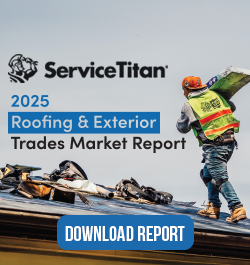



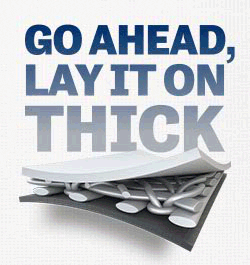







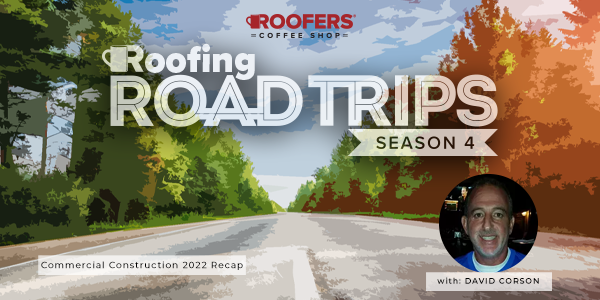
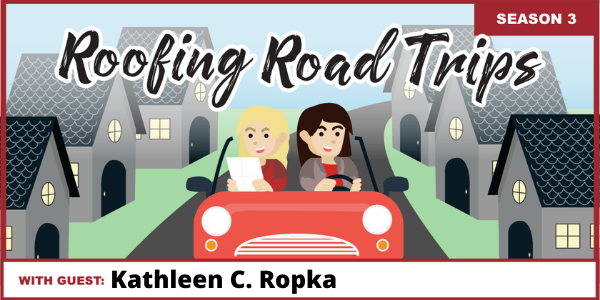
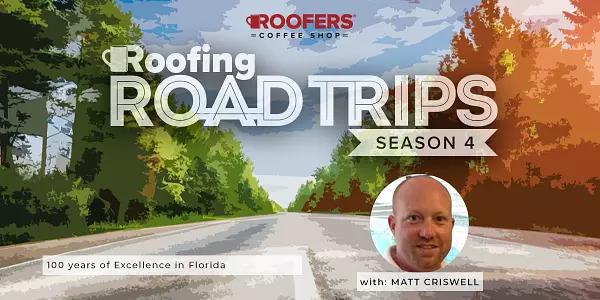
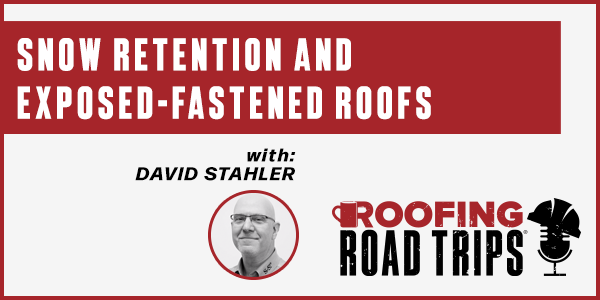





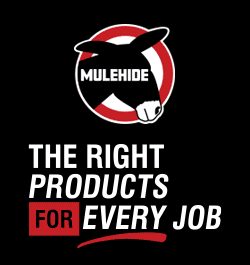

Comments
Leave a Reply
Have an account? Login to leave a comment!
Sign In